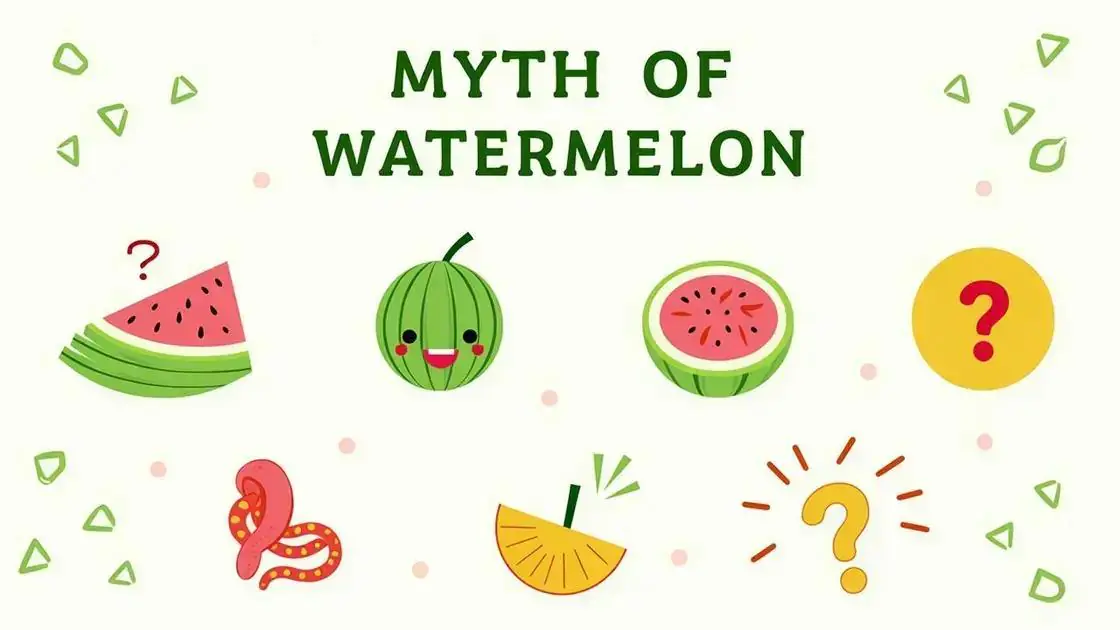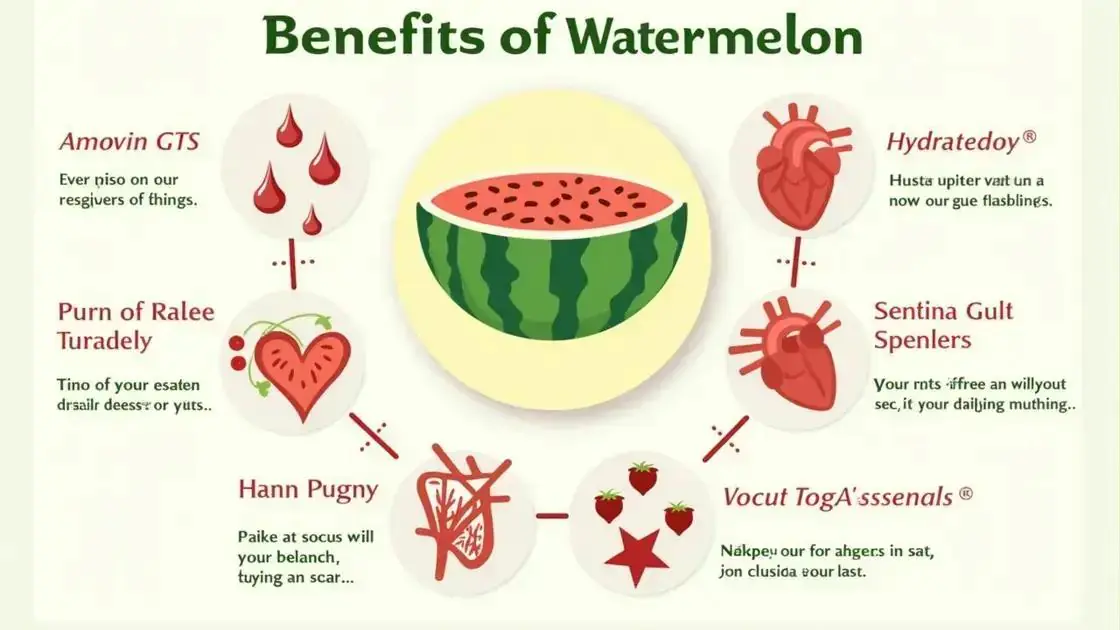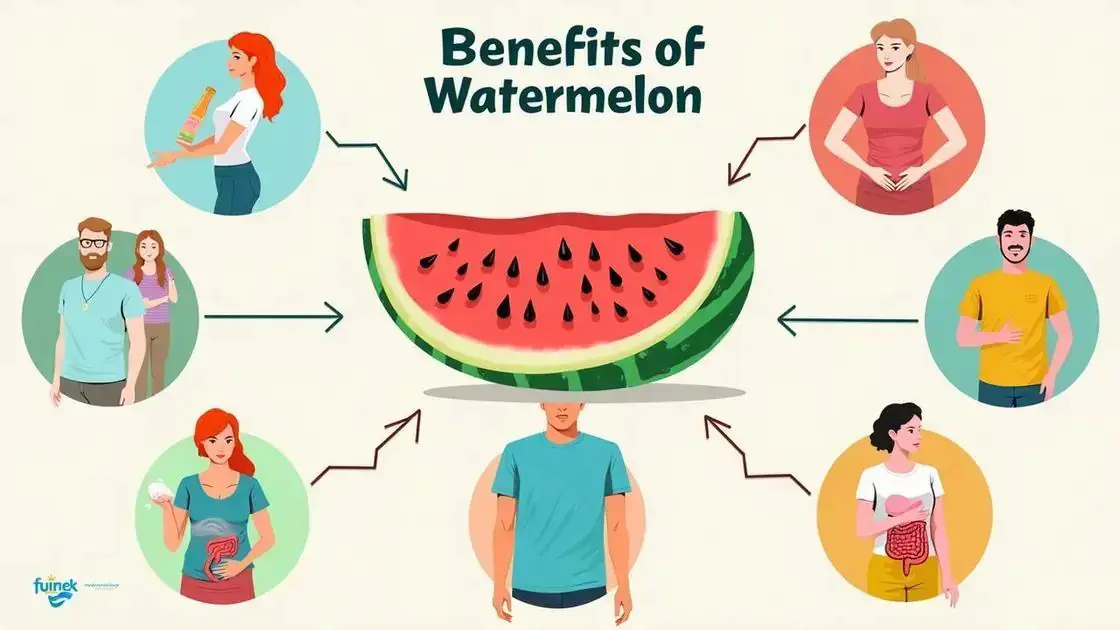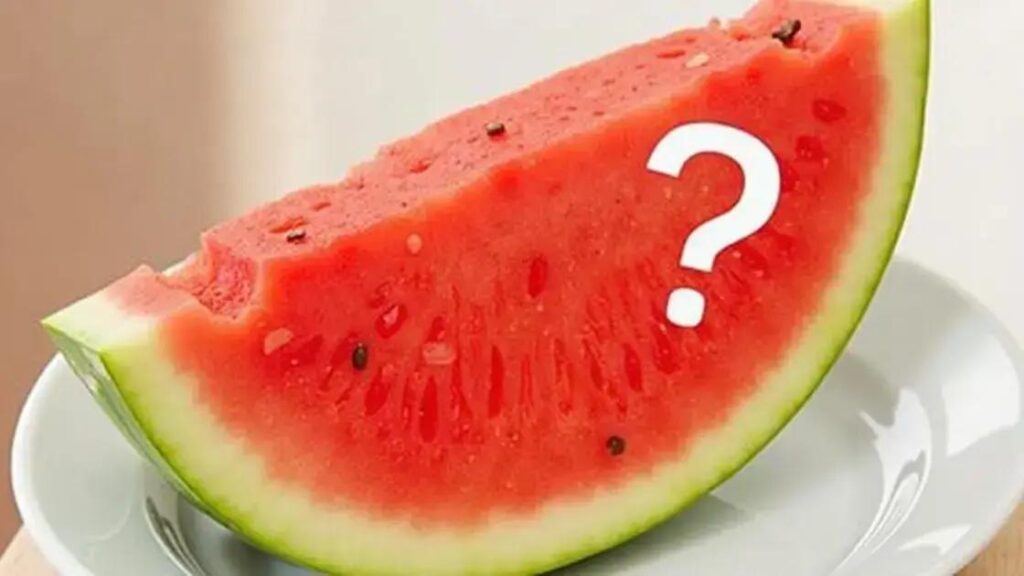The Watermelon Trick refers to the potential health benefits of watermelon, such as hydration, weight management, and improved skin health, backed by scientific evidence and rich in nutrients like vitamins A and C, while debunking common myths about its consumption.
Have you ever heard of the Watermelon Trick? This popular myth claims that watermelon can help with hydration and weight loss. In this article, we delve into the truth behind the Watermelon Trick, examining the myths, scientific evidence, and real benefits of this refreshing fruit. Join us as we uncover whether the Watermelon Trick is a reality or just a fruity myth!
What is the Watermelon Trick?

The Watermelon Trick refers to the idea that eating watermelon can help with various health-related benefits. This seriously refreshing fruit is not just a summer delight; it has garnered attention for its supposed ability to hydrate and even boost weight loss efforts. Many believe that the high water content and natural sugars can lead to these positive outcomes, but is this really true?
Understanding the Trick
The core of the Watermelon Trick lies in the attributes of watermelon itself. This popular fruit is made up of about 92% water. Because it’s so hydrating, some claim that it can be a fulfilling snack that substitutes for heavier meals. Additionally, some versions of the trick suggest that eating it can satisfy sweet cravings without added sugars.
Origins of the Watermelon Trick
The origins of the Watermelon Trick are often tied to diet fads and social media where influencers promote the fruit as a “superfood.” Advocates mention its vitamins A and C, and cite fiber content as contributing to its health benefits. However, these claims often lack scientific backing.
How It’s Regarded Today
Despite the myths, watermelon continues to hold a special place in health discussions. It’s widely recognized as a low-calorie option, perfect for those looking to maintain a balanced diet. This has sparked interest in the Watermelon Trick and encourages more research into its effects on health.
Myths Surrounding Watermelons

There are many myths surrounding watermelons that lead to confusion about their health benefits. One common myth is that watermelon is high in sugar and will contribute to weight gain. In reality, watermelon is low in calories, with only about 30 calories per 100 grams. Moreover, the natural sugars in watermelon come with fiber and water, which can help with digestion and hydration.
Watermelon and Weight Loss
Another myth suggests that eating watermelon alone can lead to significant weight loss. While it can be included in a weight-loss diet due to its low calorie content, relying solely on watermelon is not a balanced approach. It’s important to include a variety of fruits and vegetables for overall health.
The Hydration Myth
Some people believe that watermelon can replace water entirely. While it is very hydrating due to its high water content, it should not be the only source of hydration. Watermelon can be a part of an overall fluid intake plan, but plain water is still essential for proper hydration.
Digestive Health Confusion
A prevalent myth claims that watermelon causes digestive issues. While some individuals might experience bloating, this is often due to eating large quantities. For the majority, watermelon is gentle on the stomach and can contribute to digestive health due to its fiber content.
Excessive Sweets Situation
Lastly, the idea that watermelon can spike blood sugar levels is misunderstood. Eating watermelon in moderation is generally safe for people with diabetes. In fact, its natural sweetness can satisfy cravings for sugary snacks.
Scientific Evidence Behind the Trick

Scientific evidence concerning the Watermelon Trick shows that this fruit can indeed have some positive effects on health. For starters, watermelon is rich in amino acids like citrulline, which studies suggest may help improve blood flow and reduce muscle soreness. Some research indicates that consuming watermelon after exercise can enhance recovery.
Hydration Factors
Watermelon is composed of about 92% water, making it a fantastic option for hydration. Studies confirm that fruits with high water content can help maintain hydration levels during warmer months or intense physical activities.
Effects on Weight Management
Research suggests that incorporating watermelon into a balanced diet may support weight management efforts. Its low calorie count, combined with high water and fiber content, can help users feel full, thereby potentially reducing overall calorie intake.
Nutritional Components
Watermelon is also packed with vitamins, including vitamin A and vitamin C. These vitamins have antioxidant properties that may contribute to overall health. For instance, vitamin C is known to boost the immune system, while vitamin A is essential for vision and skin health.
Other Potential Benefits
Some studies have explored the benefits of watermelon for heart health. The antioxidants and lycopene present in watermelon may help lower blood pressure and improve cholesterol levels, contributing to cardiovascular wellness.
Real Benefits of Watermelon Consumption

Eating watermelon offers numerous benefits for health. One of the most known advantages is its hydration properties. Since watermelon is made up of around 92% water, it helps keep your body hydrated, especially during hot days or after exercise. Staying hydrated is important for maintaining energy levels and supporting overall bodily functions.
Nutrient-Rich
Watermelon is a nutrient powerhouse. It is low in calories but high in essential vitamins and minerals, such as vitamins A and C. Vitamin A supports eye health, while vitamin C is vital for immune system health and skin. Additionally, watermelon contains potassium, which can help regulate blood pressure.
Antioxidant Properties
Another significant benefit is its rich antioxidant content. Watermelon contains lycopene, a powerful antioxidant that gives the fruit its red color. Research suggests that lycopene may help reduce the risk of certain cancers and promote heart health by lowering cholesterol levels.
Digestive Benefits
Watermelon also supports digestive health. It contains a small amount of fiber, which is essential for maintaining a healthy digestive system. Eating foods high in water content like watermelon can also support regular bowel movements by providing necessary hydration and fiber.
Skin Health Benefits
Regular consumption of watermelon can positively impact your skin. The high vitamin C content can help in the production of collagen, which is important for skin elasticity. The hydrating properties of watermelon can also aid in keeping skin moist and fresh.
In conclusion, understanding the Watermelon Trick
The Watermelon Trick has sparked curiosity regarding its actual benefits. Through exploring myths and scientific evidence, we’ve seen that watermelon does indeed offer numerous health advantages.
This refreshing fruit is not only hydrating but also packed with essential nutrients and antioxidants that contribute to overall health. Its role in digestion and skin health further emphasizes the importance of including watermelon in a balanced diet.
By separating myth from reality, we can appreciate watermelon for its true value and ensure we are reaping all the benefits it has to offer in our daily lives.
FAQ – Frequently Asked Questions about the Watermelon Trick
What is the Watermelon Trick?
The Watermelon Trick refers to the claims that eating watermelon can help with hydration, weight loss, and other health benefits.
Is watermelon good for hydration?
Yes, watermelon is made up of about 92% water, making it an excellent source for hydration, especially in hot weather.
Does watermelon help with weight loss?
While watermelon is low in calories and can help you feel full, it should be part of a balanced diet for effective weight management.
Can watermelon improve skin health?
Yes, the vitamin C and hydration from watermelon can support collagen production and keep skin moist and healthy.
What nutrients are found in watermelon?
Watermelon is rich in vitamins A and C, as well as potassium and antioxidants like lycopene, all of which contribute to overall health.
Are there any myths about watermelon consumption?
Common myths include that watermelon causes weight gain or digestive issues. In reality, watermelon is low in calories and can aid digestion.













